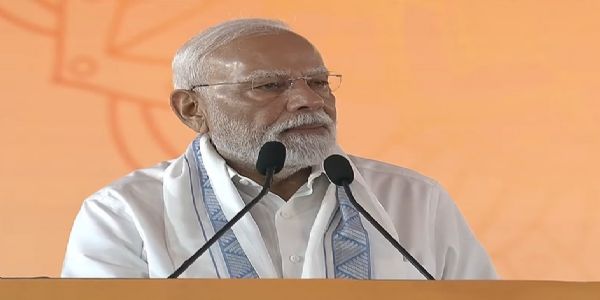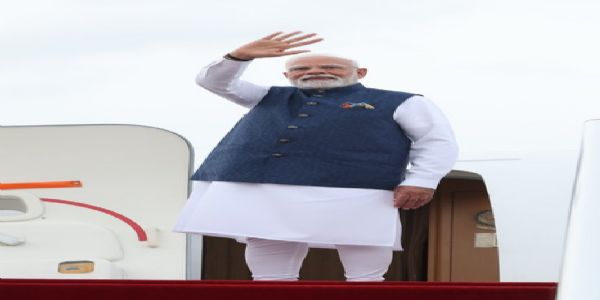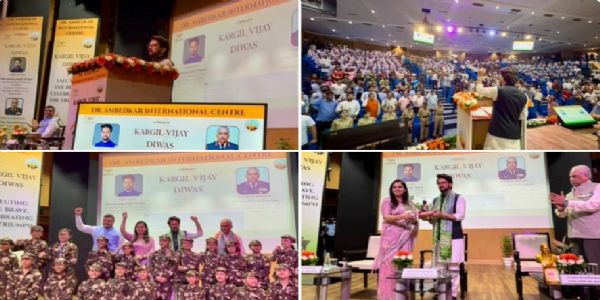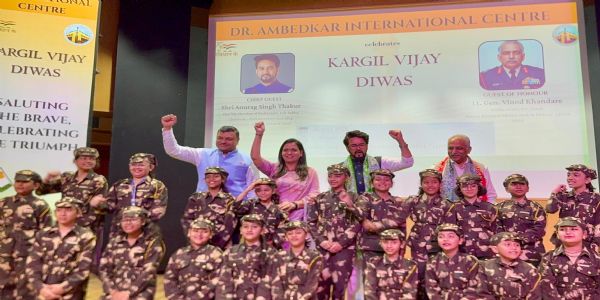
Delhi, 26 July (H.S.): The 26th anniversary of Kargil Vijay Diwas was marked by the Indian Army with deep reverence and national engagement, paying tribute to the soldiers who demonstrated exceptional valor during the 1999 Kargil War. The central commemoration took place at the Kargil War Memorial in Dras over two days, attended by prominent figures including Minister Dr. Mansukh Mandaviya, Minister of State for Defence Sanjay Seth, Lieutenant Governor of Ladakh Kavinder Gupta, and Chief of the Army Staff General Upendra Dwivedi. The events included heartfelt tributes from military and civilian dignitaries, the lighting of 545 lamps in memory of the fallen, and the recognition of Veer Naris and Next of Kin.
In a significant gesture of inclusion, the Army engaged with families of all 545 martyrs across India and Nepal, sharing their stories and valor. General Upendra Dwivedi inaugurated several legacy projects, including the Indus Viewpoint, the e-Shradhanjali portal, and a QR-based Audio Gateway, enhancing historical narrative accessibility. A Capability Display presented advancements in indigenous military technology, including mobility and surveillance systems, highlighting the Army's commitment to modernization.
The commemorations included a Battle Briefing and Remembrance Ceremony at Lamochen Viewpoint, featuring veterans' firsthand accounts and an audio-visual presentation of the Kargil conflict. Minister Dr. mandaviya honored the Next of Kin, while a community meal, Vijay Bhoj, symbolized unity and tribute. The day featured cultural performances by soldiers, NCC cadets, and students, along with a technology demonstration of drones, showcasing military innovation.
The evening program, 'Shaurya Sandhya,' was a poignant tribute to the fallen, with musical performances narrating heroic tales and prayers from representatives of various faiths, symbolizing national unity in remembrance. The evening concluded with the Felicitation Ceremony for the Next of Kin of nine martyrs, attended by over 400 guests, expressing collective gratitude for their sacrifices.
On the main day of Kargil Vijay Diwas, the Wreath Laying Ceremony commenced, led by the dignitaries, who were joined by military leaders, gallantry awardees, and families of the fallen. The emotional atmosphere was underscored by the “Last Post,” evoking deep remembrance. In his address, COAS General Upendra Dwivedi honored the courage and sacrifice of the soldiers, reflecting on the significant victory in 1999 and principles guiding the Army in contemporary missions. He emphasized India's commitment to peace while maintaining the readiness to respond to provocations, detailing initiatives for a future-ready force.
General Dwivedi initiated legacy projects aimed at enhancing remembrance and community engagement, including the Indus View Point for promoting Battle Area Tourism, the e-Shradhanjali Portal for tributes, and a QR-Based Audio Gateway for historical insights. Additionally, commendation cards were awarded to exemplary personnel, reinforcing the Army's commitment to their welfare.
A noteworthy special outreach drive saw 37 Army teams visiting families of all 545 martyrs across multiple states and Nepal, fostering pride and remembrance. The #OnThisDay campaign employed digital storytelling to recreate major battles, energizing youth awareness and participation. Adventure and cultural activities were organized in Kargil and surrounding regions, promoting community involvement.
The Capability Display showcased the Army's modernization efforts, illustrating advancements for high-altitude warfare under the theme “Tech Absorption: Imbibe, Innovate, Integrate.” The day concluded with a powerful visual display of the Tricolor illuminating the Kargil War Memorial, symbolizing national pride and memory. The 26th Kargil Vijay Diwas served as both a remembrance of the past and a celebration of the enduring spirit of the soldiers, embedded in the national identity. “A Grateful Nation Carves Its Heroes in Memory, Not Just in Stone.”
---------------
Hindusthan Samachar / Jun Sarkar








